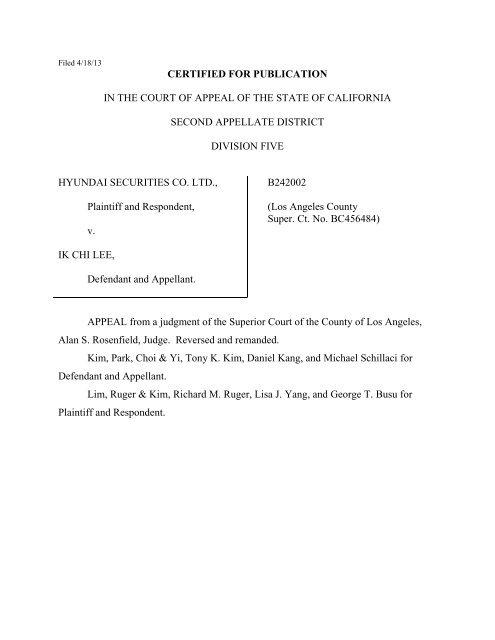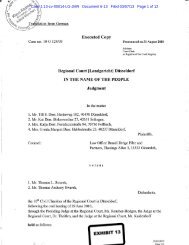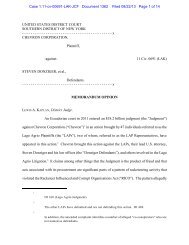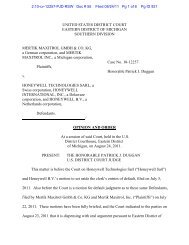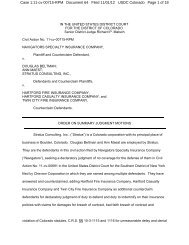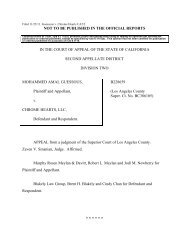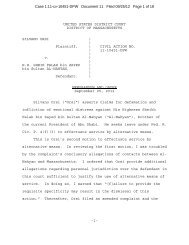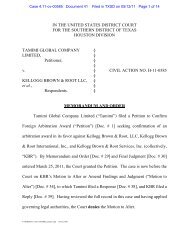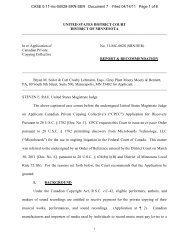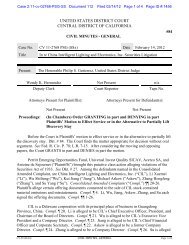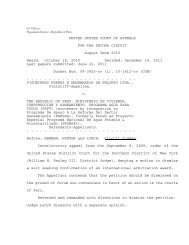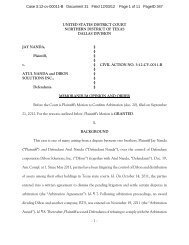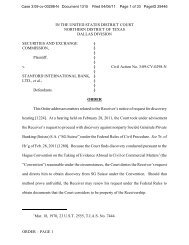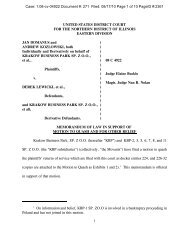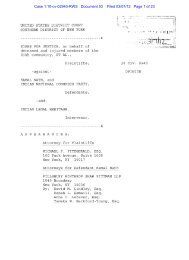Hyundai Securities Co. v. Lee (Cal. Ct. App. 2013) - Letters Blogatory
Hyundai Securities Co. v. Lee (Cal. Ct. App. 2013) - Letters Blogatory
Hyundai Securities Co. v. Lee (Cal. Ct. App. 2013) - Letters Blogatory
Create successful ePaper yourself
Turn your PDF publications into a flip-book with our unique Google optimized e-Paper software.
Filed 4/18/13<br />
CERTIFIED FOR PUBLICATION<br />
IN THE COURT OF APPEAL OF THE STATE OF CALIFORNIA<br />
HYUNDAI SECURITIES CO. LTD.,<br />
Plaintiff and Respondent,<br />
v.<br />
IK CHI LEE,<br />
Defendant and <strong>App</strong>ellant.<br />
SECOND APPELLATE DISTRICT<br />
DIVISION FIVE<br />
B242002<br />
(Los Angeles <strong>Co</strong>unty<br />
Super. <strong>Ct</strong>. No. BC456484)<br />
APPEAL from a judgment of the Superior <strong>Co</strong>urt of the <strong>Co</strong>unty of Los Angeles,<br />
Alan S. Rosenfield, Judge. Reversed and remanded.<br />
Kim, Park, Choi & Yi, Tony K. Kim, Daniel Kang, and Michael Schillaci for<br />
Defendant and <strong>App</strong>ellant.<br />
Lim, Ruger & Kim, Richard M. Ruger, Lisa J. Yang, and George T. Busu for<br />
Plaintiff and Respondent.
INTRODUCTION<br />
We hold that a proceeding under <strong>Cal</strong>ifornia‟s “Uniform Foreign-<strong>Co</strong>untry Money<br />
Judgment Recognition Act” (<strong>Co</strong>de Civ. Proc., §§ 1713-1724 (the Act)) 1 , is an action and<br />
subject to the requirements applicable to all actions. Because the trial court in this case<br />
recognized the foreign-country money judgment upon a petition rather than upon a duly<br />
noticed motion for summary judgment, judgment on the pleadings, or trial, we reverse the<br />
judgment.<br />
BACKGROUND<br />
Defendant and appellant Ik Chi <strong>Lee</strong> (<strong>Lee</strong>) was the chief executive officer of<br />
<strong>Hyundai</strong> <strong>Securities</strong> <strong>Co</strong>., Ltd. (<strong>Hyundai</strong>) between the years 1996 and 2000. Several<br />
individuals who were shareholders of <strong>Hyundai</strong> brought a shareholders‟ derivative action<br />
in the Seoul Southern District <strong>Co</strong>urt against <strong>Lee</strong>, as an officer of <strong>Hyundai</strong>, for, among<br />
other things, securities fraud by <strong>Lee</strong> during his term as chief executive officer of <strong>Hyundai</strong><br />
(the Korean Action). <strong>Lee</strong> appeared and defended the Korean Action.<br />
In the Korean Action, the Seoul Southern District <strong>Co</strong>urt entered against <strong>Lee</strong> and in<br />
favor of <strong>Hyundai</strong> a judgment in the principal amount, which, when converted to United<br />
States dollars as of the time of entry of judgment, was approximately $18,839,155. The<br />
Korean Judgment also provided for prejudgment interest at five percent per annum and<br />
post judgment interest at the rate of 20 percent per annum, payable according to Korean<br />
law.<br />
<strong>Lee</strong> appealed the Korean Judgment to the Seoul <strong>Co</strong>urt of <strong>App</strong>eals, which<br />
“dismissed” the appeal. <strong>Lee</strong> then appealed the Seoul <strong>Co</strong>urt of <strong>App</strong>eals decision to the<br />
Korean Supreme <strong>Co</strong>urt, which also “dismissed” the appeal. Both “dismissals” were<br />
based on the appeals lacking merit.<br />
1 All further statutory references are to the <strong>Co</strong>de of Civil Procedure.<br />
2
The Korean Supreme <strong>Co</strong>urt, by upholding the monetary portions of the Korean<br />
Judgment, rendered the Korean Judgment final, conclusive, and enforceable. There is no<br />
evidence that the monetary portions of the Korean Judgment were vacated, modified, or<br />
set aside, or that there could be any further appeal.<br />
<strong>Hyundai</strong> filed an action in the Los Angeles Superior <strong>Co</strong>urt pursuant to the Act,<br />
seeking recognition of the Korean Judgment. Thereafter, <strong>Hyundai</strong> filed a first amended<br />
complaint in which <strong>Hyundai</strong> alleged the existence of the Korean Judgment that awarded<br />
money damages; that the Korean Judgment was final, conclusive, and enforceable in<br />
Korea; that <strong>Hyundai</strong> had already taken steps to execute, and did execute, the Korean<br />
Judgment against certain of <strong>Lee</strong>‟s real and personal properties in Korea; and that after the<br />
amount collected by <strong>Hyundai</strong> and with accrued interest, <strong>Lee</strong> owes <strong>Hyundai</strong> $40,785,<br />
124.11 plus interest that continues to accrue by $12,926.01 each day.<br />
In his answer, <strong>Lee</strong> alleged a general denial and asserted his affirmative defenses,<br />
some of which are those arguably covered by section 1716, subdivision (c) as permitted<br />
defenses to recognition of a foreign-country money judgment. <strong>Lee</strong> asserted that there is a<br />
conflicting judgment by which <strong>Hyundai</strong> was awarded all damages it seeks in this action,<br />
that the damages constitute a fine or penalty, and that the postjudgment award of 20<br />
percent interest awarded in the Korean Judgment is unenforceable in <strong>Cal</strong>ifornia. He also<br />
challenged <strong>Hyundai</strong>‟s standing because the Korean action was a derivative action.<br />
In its action, <strong>Hyundai</strong> filed a “Notice of Petition and Petition For Entry Of The<br />
<strong>Cal</strong>ifornia Judgment pursuant to the Uniform Foreign <strong>Co</strong>untry Money Judgments<br />
Recognition Act,” along with declarations of Korean attorneys and its attorney in this<br />
action and points and authorities. In the “petition,” <strong>Hyundai</strong> set forth the existence of the<br />
Korean Judgment showing it was compensatory in nature and that it was final,<br />
conclusive, and enforceable in Korea. <strong>Hyundai</strong> asserted that although it was not initially<br />
named as plaintiff in the Korean Action that was brought by <strong>Hyundai</strong>‟s shareholders as a<br />
shareholder derivative action, <strong>Hyundai</strong> was the judgment creditor under the Korean<br />
Judgment.<br />
3
In opposition, <strong>Lee</strong> argued that judgment could not be entered on a “petition” rather<br />
than on a motion for summary judgment or trial. <strong>Lee</strong> also argued his affirmative<br />
defenses, and provided law and facts in support of his allegations. Among them, <strong>Lee</strong><br />
asserted that he was entitled to an offset because <strong>Hyundai</strong> allegedly recovered a large<br />
sum of money in a separate Korean lawsuit in which <strong>Lee</strong> was not a party; <strong>Hyundai</strong> lacked<br />
standing; the Korean Judgment was not compensatory in nature, but rather was a fine or<br />
penalty arising out of securities violations—“the penal conduct for which <strong>Lee</strong> went to jail<br />
in Korea”—and therefore the judgment cannot be recognized under the Act; and the<br />
postjudgment interest rate of 20 percent awarded in the Korean Judgment was<br />
“repugnant” to <strong>Cal</strong>ifornia public policy. The trial court sustained <strong>Lee</strong>‟s evidentiary<br />
objections without prejudice and requested further briefing on several issues.<br />
<strong>Hyundai</strong> filed a supplemental brief and a declaration from another Korean attorney<br />
on the nature of the Korean action. <strong>Lee</strong> objected to the new declaration challenging the<br />
declarant‟s qualification to give a declaration on Korean law described in the declaration,<br />
and asserted that the Korean law the attorney provided did not resolve the issues raised<br />
by <strong>Lee</strong>. The trial court did not rule on the supplemental objections.<br />
Following oral argument, the trial court granted “the motion” and rejected the<br />
request for a statement of decision because “[t]his is specifically being entered without a<br />
summary judgment, without a trial, and has no entitlement to a Statement of Decision.”<br />
After further submissions on <strong>Hyundai</strong>‟s proposed judgment, a judgment was entered. A<br />
timely appeal followed.<br />
A. Standard of Review<br />
DISCUSSION<br />
Questions of law regarding the application and requirements of the Act are<br />
reviewed de novo. (See People v. ex rel Lockyer v. Shamrock Foods <strong>Co</strong>. (2000) 24<br />
<strong>Cal</strong>.4th 415, 432; Ghirardo v. Antonioli (1994) 8 <strong>Cal</strong>.4th 791, 799-801; MacIsaac v.<br />
4
Waste Management <strong>Co</strong>llection & Recycling, Inc. (2005) 134 <strong>Cal</strong>.<strong>App</strong>.4th 1076, 1081-<br />
1082.)<br />
B. The Act<br />
The Act, which is based on the Uniform Foreign-<strong>Co</strong>untry Money Judgments<br />
Recognition Act (13 (Part. II)) Uniform Laws Annotated, Civil Procedural and Remedial<br />
Laws (2012 Supp.) 18), applies to foreign-country judgments that grant or deny recovery<br />
of a sum of money and that are final, conclusive, and enforceable under the law of the<br />
foreign country. (§§ 1715(a), 1724.) The Act, contained in <strong>Co</strong>de of Civil Procedure Part<br />
3—“Of Special Proceedings of a Civil Nature”—sets forth the procedure for recognition<br />
of a foreign-country money judgment by providing the requirement that “the issue of<br />
recognition shall be raised by filing an action” or by “counterclaim, cross-claim, or<br />
affirmative defense.” (§ 1718, subds. (a), (b).) The Act contains a 10-year period of<br />
limitations for bringing an action to recognize a foreign-country money judgment.<br />
(§ 1721.) It allocates the burden of proof for establishing whether a foreign-country<br />
money judgment is within the scope of the Act and whether there is any ground for not<br />
recognizing the existence of the judgment. (§§ 1715(c), 1716.) The party seeking<br />
recognition of a foreign-country money judgment has the burden to establish entitlement<br />
to recognition under the Act, while the party resisting recognition has the burden of<br />
establishing a specified ground for nonrecognition. (Ibid.) The Act specifies that if the<br />
court finds that a foreign-country money judgment is entitled to recognition in <strong>Cal</strong>ifornia<br />
then, to the extent the judgment grants or denies recovery of a sum of money, it is<br />
conclusive between the parties to the same extent as the judgment of a sister-state entitled<br />
to full faith and credit in this state would be conclusive, and the foreign-country money<br />
judgment is enforceable in the same manner and to the same extent as a judgment<br />
rendered in this state. (§ 1719.)<br />
The Act provides for various defenses if the foreign-country money judgment is<br />
final, conclusive, and enforceable where rendered. These include, in essence, when the<br />
foreign-country money judgment was rendered under circumstances that violated due<br />
5
process or lacked impartiality or integrity, was without jurisdiction, was without notice,<br />
or was in conflict with <strong>Cal</strong>ifornia public policy or another judgment. (§ 1716.) Unless<br />
one of the specified defenses applies, the court “shall recognize a foreign-country<br />
judgment to which [the Act applies].” (§ 1716, subd. (a).) The Act does not apply, inter<br />
alia, to a fine or penalty. (§ 1715, subd. (b)(2).)<br />
C. Rules of Interpretation<br />
“Our fundamental task in interpreting a statute is to determine the Legislature‟s<br />
intent so as to effectuate the law‟s purpose. We first examine the statutory language,<br />
giving it a plain and commonsense meaning. We do not examine that language in<br />
isolation, but in the context of the statutory framework as a whole in order to determine<br />
its scope and purpose and to harmonize the various parts of the enactment. If the<br />
language is clear, courts must generally follow its plain meaning unless a literal<br />
interpretation would result in absurd consequences the Legislature did not intend. If the<br />
statutory language permits more than one reasonable interpretation, courts may consider<br />
other aids, such as the statutes‟ purpose, legislative history, and public policy.<br />
[Citations.]” (<strong>Co</strong>alition of <strong>Co</strong>ncerned <strong>Co</strong>mmunities, Inc. v. City of Los Angeles (2004) 34<br />
<strong>Cal</strong>.4th 733, 737.)<br />
D. Procedure Under the Act<br />
The Act states that “the issue of recognition shall be raised by filing an action<br />
seeking recognition of the foreign-country judgment” (§ 1718, subd. (a)), and authorities<br />
suggest that the procedures associated with any action set forth in the <strong>Co</strong>de of Civil<br />
Procedure are applicable to an action filed under the Act. In Renoir v. Redstar <strong>Co</strong>rp.<br />
(2004) 123 <strong>Cal</strong>.<strong>App</strong>.4th 1145, arising under a predecessor of the Act, we held that the<br />
Uniform Foreign Money-Judgments Recognition Act then in effect “requires that foreign<br />
country money judgments be enforced by bringing an action, and, as in other actions, a<br />
summons must be served to obtain personal jurisdiction over a defendant (<strong>Co</strong>de Civ.<br />
Proc., § 410.50, subd. (a)).” (Renoir v. Redstar <strong>Co</strong>rp., supra, 123 <strong>Cal</strong>.<strong>App</strong>.4th at p.<br />
6
1148.) In Manco <strong>Co</strong>ntracting <strong>Co</strong>. (W.L.L.) v. Bezdikian (2008) 45 <strong>Cal</strong>.4th 192 (Manco),<br />
which arose under the predecessor of the Act, the Supreme <strong>Co</strong>urt held that <strong>Cal</strong>ifornia<br />
courts must look to the law of the foreign jurisdiction to determine the judgment‟s finality<br />
and conclusiveness and that the 10-year statute of limitations in section 337.5,<br />
subdivision (b) applicable to the enforcement of sister-state money judgments, applies to<br />
actions under the predecessor of the Act. In discussing the statute of limitations issue, the<br />
court pointed out that the Legislature amended the statute so that the foreign-country<br />
money judgment must “„be enforced with “all the normal trappings of an original action”<br />
that had existed before in connection with the enforcement of sister-state judgments.<br />
[Citations.]‟ (Renoir v. Redstar <strong>Co</strong>rp., supra, 123 <strong>Cal</strong>.<strong>App</strong>.4th at pp. 1150-1151.)” (Id.<br />
at p. 205.) The court went on, “<strong>Cal</strong>ifornia has not enacted an expedited procedure for the<br />
registration of foreign judgments. Rather, a party seeking recognition of a foreign<br />
judgment under the UFMJRA [Uniform Foreign Money-Judgment Recognition Act]<br />
must file a civil action. (Renoir v. Redstar <strong>Co</strong>rp., supra, 123 <strong>Cal</strong>.<strong>App</strong>.4th at p. 1151.) In<br />
<strong>Cal</strong>ifornia, „[c]ivil actions, without exception,‟ must be commenced within a statutorily<br />
prescribed limitations period. (§ 312, italics added.)” (Manco, supra, 45 <strong>Cal</strong>.4th at p.<br />
207, fn. omitted.)<br />
Moreover, that recognition of a foreign-country money judgment “may be raised<br />
by counterclaim, cross-claim, or affirmative defense” in an action (§ 1718, subd. (b)) also<br />
suggests that recognition under the Act is subject to the normal procedures in any action.<br />
As one authority has written about the predecessor of the Act, a defendant may obtain a<br />
dismissal of the foreign-country money judgment recognition action “on the pleadings or<br />
in summary adjudication”—the procedures applicable in actions. (McKnight,<br />
Enforcement of a Foreign Money Judgment in <strong>Cal</strong>ifornia 1 (No. 2) (1990) The<br />
International Practitioner 1.)<br />
By permitting the matter to proceed by way of a motion or petition in the action,<br />
the trial court treated the matter as if it were a certain special proceeding, such as<br />
petitions to compel, confirm, or vacate domestic or foreign arbitration awards. (See<br />
§ 1280 et seq; Dial 800 v. Fesbinder (2004) 118 <strong>Cal</strong>.<strong>App</strong>.4th 32, 48 [“Section 1286 does<br />
7
not bar a <strong>Cal</strong>ifornia judge from confirming a foreign arbitrator panel‟s award”].) The<br />
arbitration statute explicitly provides for special procedures by specifying that “a petition<br />
under this title shall be heard in a summary way in the manner and upon notice provided<br />
by law for the making and hearing of motions, except that not less than 10 days‟ notice of<br />
the date set for the hearing on the petition shall be given.” (§ 1290.2.) The Act, which<br />
expressly requires an “action,” has no comparable provision for a summary proceeding.<br />
Unlike other special proceedings in Part 3 of the <strong>Co</strong>de of Civil Procedure, 2 the<br />
Legislature, in providing for the procedures for recognition of a foreign-country money<br />
judgment, only specified that the issue of recognition is to be raised by filing an action or<br />
by way of a counterclaim, cross-claims or affirmative defense. (§ 1718.) The Legislature<br />
set forth procedures for other special proceedings. For example, as noted, it provided for<br />
the specific summary procedures for compelling, confirming, and vacating arbitration<br />
awards (§§ 1280 et seq.), and it provided for a registration procedure for recognizing<br />
sister-state money judgments. (§§ 1710.10-1710.60.) 3<br />
The Act is contained in <strong>Co</strong>de of Civil Procedure Part 3—Of Special Proceedings<br />
of a Civil Nature. Section 22 defines an action as “an ordinary proceeding in a court of<br />
justice by which one party prosecutes another for the declaration, enforcement, or<br />
protection of a right, the redress or prevention of a wrong, or the punishment of a public<br />
offense.” Section 23 defines a special proceeding as “[e]very other remedy.” (See<br />
People v. Yartz (2005) 37 <strong>Cal</strong>.4th 529, 536.) Generally, with respect to special<br />
proceedings, the Legislature has set forth specific procedures, but the only procedure<br />
specified for recognition of a foreign-country money judgment is that it be raised by<br />
filing an action. Thus, whether recognition of a foreign-country money judgment is an<br />
2 Part 3 includes such proceedings as writs, contesting elections, contempts, eminent<br />
domain, name changes, arbitration, unclaimed property, sister-state judgments,<br />
mediation, preferences, tribal injunctions, inspection warrants, and certain proceedings<br />
against municipal corporations.<br />
3 As to procedures for other special proceedings, see, e.g., sections 1067 et seq.<br />
(writs), sections 1230.010-1268.720 (eminent domain).<br />
8
action or special proceeding, we believe the Legislature intended the procedures for<br />
actions to be applicable to proceedings to obtain such recognition.<br />
Requiring the procedures applicable to actions for recognition of a foreign-country<br />
money judgment makes sense. Such actions are comparable to any claim for a money<br />
judgment. (See Umstetter, Enforcing Foreign Judgments: In Search of a Treaty to<br />
Locate Assets Abroad (2007) 3 S.C.J. of Int‟l L. & Bus. 85, 89 [Uniform Foreign Money-<br />
Judgments Act “basically codifies the common law”]); Sung Hwan <strong>Co</strong>., Ltd. v. Rite Aid<br />
<strong>Co</strong>rporation (N.Y. 2006) 850 N.E.2d 647, 650; Lenchyshyn v. Pelko Electric, Inc.<br />
(N.Y.A.D. 2001) 723 N.Y.S.2d 285, 288 [“codifies common-law principles applicable to<br />
recognition of foreign country judgments”]; but see Chase Manhattan Bank, N.A. v.<br />
Hoffman (D. Mass. 1987) 665 F.Supp. 73, 77 [Uniform Foreign Money-Judgments<br />
Recognition Act revises and supersedes common law].) Proceedings under the Act may<br />
involve disputed issues of fact. For example, if the foreign law cannot be determined, a<br />
factual determination may be required. (See 1 Witkin, <strong>Cal</strong>. Evidence (5th ed. 2012)<br />
Judicial Notice, § 29, p.; 136; Estate of Arbulich (1953) 41 <strong>Cal</strong>.2d 86, 90 [“how the<br />
foreign country has construed and applied . . . statutes is a question of fact”]; but see<br />
Evid. <strong>Co</strong>de, § 310, subd. (b)); Societe Civile Succession Richard Guino v. Redstar <strong>Co</strong>rp.<br />
(2007) 153 <strong>Cal</strong>.<strong>App</strong>.4th 697, 701.) Another issue of fact relevant here may be whether<br />
the foreign judgment has been satisfied in whole or in part.<br />
There is nothing in the legislative history of the Act indicating special procedures<br />
for recognition, other than specifying that recognition of a foreign-country money<br />
judgment must be raised by an action. (See Stats. 2007, ch. 212, p. 2543 [enacting Sen.<br />
Bill No. 639 (2007-2008 Reg. Sess.)].) The comment to the Uniform Foreign-<strong>Co</strong>untry<br />
Money Judgments Recognition Act states that section 6 of the Uniform Act—which<br />
section is section 1718 in the <strong>Cal</strong>ifornia statute—“rejects the use of any registration<br />
procedure.” (13 (Part II) Uniform Laws Annotated Supp., supra, at p. 33.) The comment<br />
points out that the “truncated procedures” used in connection with sister-state judgments<br />
are appropriate because “there is a strong presumption of fairness and competence<br />
attached to a sister-state judgment that justifies use of a registration procedure.” (Ibid.)<br />
9
“Unlike the limited grounds for denying full faith and credit to a sister-state judgment,<br />
this Act provides a number of grounds upon which recognition of a foreign-country<br />
judgment may be denied. . . . The existence of these grounds for nonrecognition reflects<br />
the fact there is less expectation that foreign-country courts will follow procedures<br />
comporting with U.S. notions of fundamental fairness and jurisdiction or that those courts<br />
will apply laws viewed as substantively tolerable by U.S. standards than there is with<br />
regard to sister-state courts.” (Ibid.) 4 The comment further states, “While this Section<br />
sets out the ways in which the issue of recognition of a foreign-country judgment may be<br />
raised, it is not intended to create any new procedure not currently existing in the state or<br />
to otherwise effect existing state procedural requirements. The parties to an action in<br />
which recognition of a foreign-country judgment is sought under Section 6 must comply<br />
with all state procedural rules with regard to that type of action.” (Id. at p. 34.) Thus, in<br />
this action, state procedures must be followed. 5<br />
<strong>Hyundai</strong> asserts that we acquiesced in a truncated or summary proceeding in<br />
Societe Civile Successor Richard Guino v. Redstar <strong>Co</strong>rp., supra, 153 <strong>Cal</strong>.<strong>App</strong>.4th 697.<br />
4 “Historically, it has been fairly easy for large U.S. companies to win a decision of<br />
unenforceability because „it is often particularly difficult to reconcile American dueprocess<br />
concepts with foreign proceedings.‟” (Payne, Aguinda v. Chevron: The<br />
Potential Rise or Fall of Mass Toxic Tort Claims Against U.S. <strong>Co</strong>mpanies (2012) 46 The<br />
Int‟l Lawyer 1067, 1077.)<br />
5 We have found little, if any, discussion as to the procedures to be used in various<br />
jurisdictions, and the issue may be dependent on the precise wording of the applicable<br />
state statutes. (See e.g., Aguerre v. Schering-Plough <strong>Co</strong>rp. (N.J. Super. 2007) 924 A.2d<br />
571, 582 [defense under Foreign-<strong>Co</strong>untry Money Judgments Act—trial and discovery];<br />
Servaas, Inc. v. Republic of Iraq (S.D.N.Y. 2012) 2012 WL 335654 [summary<br />
judgment]; Hennessy v. Marshall (Tex.<strong>App</strong>. 1984) 682 S.W.2d 340, 342 [“plenary suit<br />
and hearing” required (Hennessey)]; Razo v. Vargas (Tex.<strong>App</strong>. 2011) 355 S.W.3d 866,<br />
872 [approving Hennessey]; Byblos Bank Europe, S.A. v. Sekerbank Turk Anonym Syrketi<br />
(N.Y. Sup. <strong>Ct</strong>. 2006) 819 N.Y.S.2d 412, 414 fn. 2 [“motion-action”], affd., 837 N.Y.S.2d<br />
54, 885 N.E.2d 191; Genujo Lok Beteiligungs GmbH v. Zorn (Me. 2008) 943 A.2d 573,<br />
581-582 [evidentiary hearing within trial court‟s discretion]; see also Nanda and Pansius,<br />
3 Litigation of International Disputes in U.S. <strong>Co</strong>urts (2d. ed. <strong>2013</strong>) Recognition of<br />
Foreign Judgments, § 20:6, pp. 20-30 to 20-43 [“The UFMJRA does not prescribe<br />
uniform procedures”].)<br />
10
That case preceded the enactment of the Act, and there is no indication that the issue of<br />
the procedure was raised. Moreover, it is not clear what proceedings occurred. There,<br />
the defendant brought a “Motion to Challenge Judgment” (id. at p. 700). There were<br />
“hearings, supplemental submissions, and a motion for reconsideration.” (Id. at p. 701.)<br />
The only issue was whether the French judgment was final, conclusive, and enforceable,<br />
a matter we determined as a matter of law. Thus, in effect, the matter could be resolved<br />
on the pleadings.<br />
As the Act requires an action, and does not provide for any procedures other than<br />
those procedures applicable to actions, a plaintiff, in order to obtain recognition of a<br />
foreign-country money judgment must proceed in accordance with the normal procedures<br />
applicable to actions and not by way of a motion or petition to recognize the foreign-<br />
country money judgment. The <strong>Co</strong>de of Civil Procedure specifies the procedures for an<br />
action. (§§ 190 et seq., 307 et seq.) Section 437c, subdivision (a) states, “Any party may<br />
move for summary judgment in any action or proceeding . . . .” (Italics added.) “The<br />
summary judgment provision has various detailed requirements, such as a 75-day notice<br />
period prior to the hearing (§ 437c, subd. (a)), a separate statement setting forth<br />
undisputed facts with citation to the supporting evidence (§ 437c, subd. (b)(1)), and<br />
others. The trial court may not employ special procedures that circumvent the procedures<br />
required by statute. (Magana Cathcart McCarthy v. CB Richard Ellis, Inc. (2009) 174<br />
<strong>Cal</strong>.<strong>App</strong>.4th 106, 116 [“courts are not free to ignore the Legislature‟s procedural<br />
requirements for the convenience of the parties . . . .”]; People v. Silva (1981) 114<br />
<strong>Cal</strong>.<strong>App</strong>.3d 538, 549 [“Where a statute requires a court to follow a particular procedure,<br />
an act beyond those limits is in excess of the court‟s jurisdiction”]; see also Gilberd v. AC<br />
Transit (1995) 32 <strong>Cal</strong>.<strong>App</strong>.4th 1494, 1501.)<br />
11
If <strong>Hyundai</strong> wishes to have its contentions dealt with summarily, it must do so by<br />
way of a motion for summary judgment or judgment on the pleadings (§ 438). If it does<br />
not succeed in a summary judgment motion or a judgment on the pleadings, the issues<br />
will require a trial.<br />
Because we are reversing and remanding the matter on procedural grounds, we do<br />
not reach other issues raised, including the offset issue. 6<br />
DISPOSITION<br />
The judgment is reversed and remanded for further proceedings in accordance<br />
with this opinion. No costs are awarded.<br />
We concur:<br />
CERTIFIED FOR PUBLICATION<br />
ARMSTRONG, Acting P. J.<br />
KRIEGLER, J.<br />
12<br />
MOSK, J.<br />
6 We do not suggest that a party may relitigate the issues decided by the Korean<br />
court if that court‟s judgment is subject to recognition under the Act.


